Be it a movie, book, or blog, EMPs are nightmare fuel. Any talk of them brings shivers down our electrically dependent spines. Grid failed. Tools fried. Lives lost. It’s everything a night terror is made of.
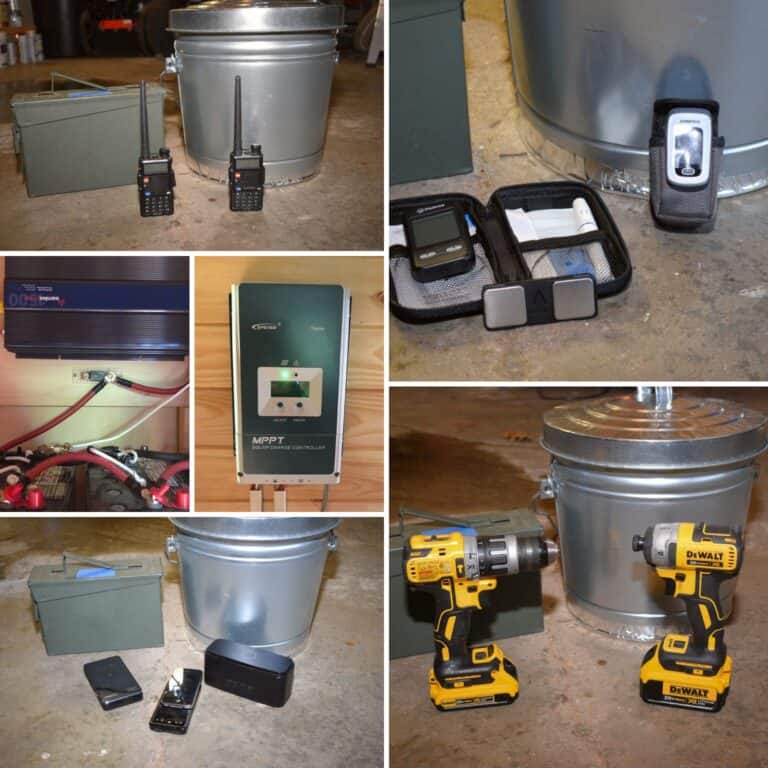
The mystery of an EMP makes this worse. Will all electronic devices get smoked, or will it be little more than a blip? The closest thing we have to hard proof of the potential damage we can experience are a 150-year-old CME and 60-year-old nuclear experiment.
In the first case our infrastructure was at its infancy, in the second the closest populated area was 900 miles away.
What we know is that to minimize personal damage, you need to secure your electronics. But what do you need to invest in? Let’s look at how to protect many common electronics you may need to persevere an EMP.
Protecting Your Electronic Devices
Protection requirements depend on three main factors. First, the sensitivity of the device. Second, the size of the EMP. Finally, the importance of the device to you is paramount to your need to protect it.
Some devices on this list may be critical to some. In this category, I include glucometers for diabetics…
However, other listed devices may be pure convenience, such as furnace or water pump parts, as there are non-electric analogs. Ultimately, decide for yourself which are the most critical to you in your current situation.
Shelter and Tools
Depending on your environment (hot south or cold north), a shelter may be number one or it may be lower on your priority list.
Regardless, you will need the materials to keep it maintained. The right tools make the job quick and efficient.
All the following items have hand-powered equivalents, but let’s be honest, would you rather cut a sheet of plywood in half with a circular saw or a handsaw?
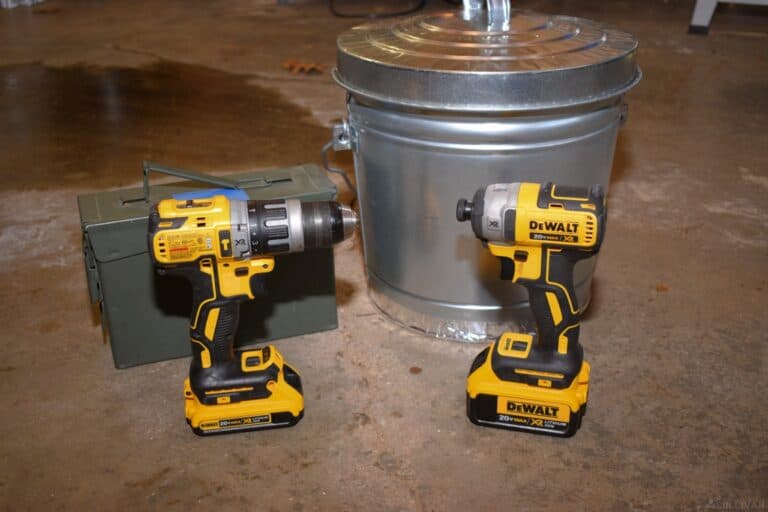
Battery-operated tools are a must-have in your Faraday cage in order to make repairs quick and easy.
1. Saws
Circular saws, reciprocating saws, scroll saws are popular because they work. I’d imagine that most garages now hold battery-operated tools that should be protected.
A garbage can faraday cage or a metal cabinet in the garage will make for quick safe storage (just remember to seal the seams).
2. Drills
A hand drill is a vehicle for madness. Having drilled a few holes with one I can attest to the benefits of a real drill with good sharp bits. Add a battery-operated drill set (both regular and an impact driver so that you can handle bolts and screws) to a faraday cage in your garage.
3. Air Compressor
Definitely a luxury, but an air compressor with a few air tools (nailers, impact wrench) will make short order of any projects. No need to protect the tools and simply place the compressor under a faraday cloth for protection.
4. Spare Batteries
If you’re storing battery-operated tools, then you must store spare batteries and chargers. Most batteries will fit in an ammo can faraday cage.
5. Energy
With the threat of a grid failure, independence requires your own power source. The good news is that you won’t need to power your home to current standards, you will be able to get by with a fraction of your current consumption.
Even if it’s just enough to charge the occasional tool or laptop (for document retrieval) then you will be better off than most.
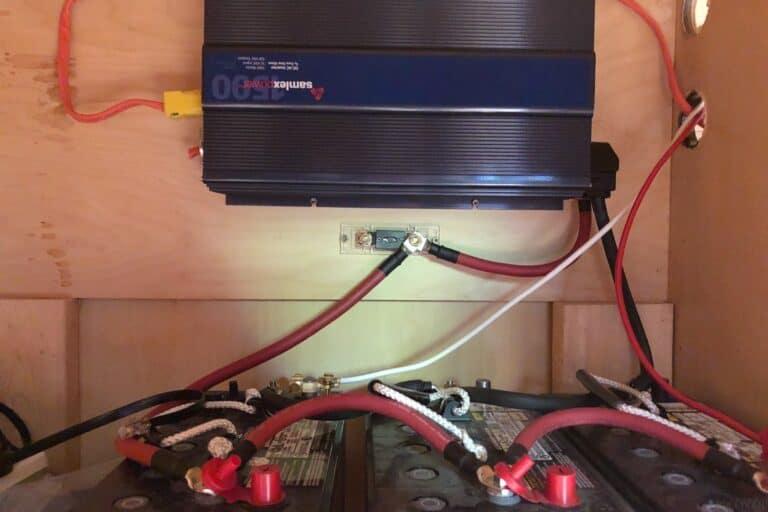
Protecting an inverter and batteries as a part of a solar system is nearly impossible. Disconnect them and protect them separately.
6. Solar Panels
The first question is where to get power from? Solar is an easy argument here. Panels last for years and don’t require fuel like a generator.
That being said, it can take many panels to output the same power as a generator. Start small and work your way up by adding more panels over time.
Panels left disconnected will most likely survive an EMP. Once they are connected to the rest of the system there may be negative effects from surges through the connected systems. Disconnect panels and drape them with a protective cloth.
Disclosure: This post has links to 3rd party websites, so I may get a commission if you buy through those links. Survival Sullivan is a participant in the Amazon Services LLC Associates Program. As an Amazon Associate, I earn from qualifying purchases. See my full disclosure for more.
7. Inverter
Inverters are relatively inexpensive so have a few different sizes on hand. They are also small enough to be kept in a Faraday cage.
8. Solar Charge Controller
A solar charge controller is the heart of your charging system. Without a controller it’s nearly impossible to charge your battery bank.
Where possible have a spare secured in a Faraday cage. If that isn’t a possibility, disconnect your charge controller at the first sign of trouble and immediately lock it in a faraday cage.
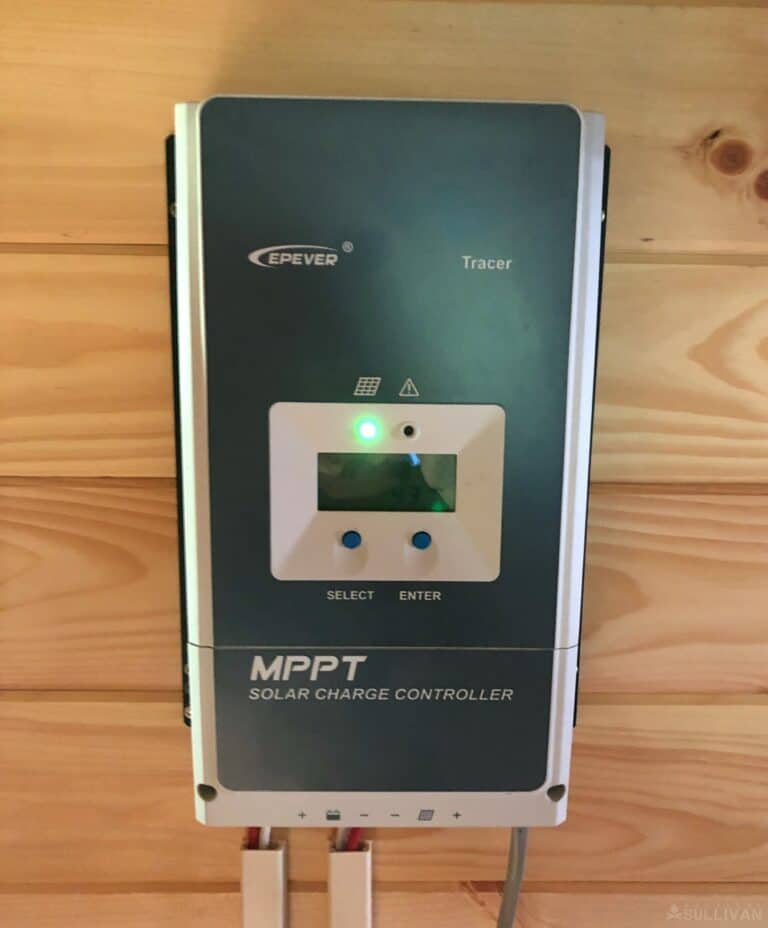
A charge controller is required to have an operating solar system, it’s best to keep a spare rather than protect one that is plugged into your system
9. Breakers
Circuit breakers are a simple, yet critical component of your home electrical system. As they are simple they are most likely resilient to EMPs. Keep a few spares in the event of failure, but no additional protection is needed.
10. Generator
With the failure of the grid, your generator will be your power source. As most generators are fairly large, a faraday cage may be impractical.
A simple wooden box completely encased with metal window screening is the easiest protection. Make sure that all seams are completely covered.
11. Batteries
Modern lithium batteries are also affected by emps. They have a little bit of circuitry in them to balance discharge. The larger the battery the more complex the cells. Small batteries can go into your faraday cage.
If storing high-capacity LiPo batteries for a solar battery bank, then a faraday cloth will be more convenient.
12. Water
Most mechanisms for gathering, moving, and purifying water does not involve electricity or have manual counterparts. There are only a few convenience components. Protect them wisely.
13. UV Filter
Gravity filters, boiling, and chemical treatment are the norm for water preparation. One additional method, favored by the RV community, is UV filtration.
Here, a column of water is passed through or around an ultraviolet lamp. Spare lamps have sensitive electronics as do the transformers and ballasts.
There are also portable UV pens for killing the critters in a single serving of water. Keep spares of each in faraday cages.
14. Pump
Moving water from one place to another, as well as pressurizing it within your house is best accomplished with a pump.
As pumps take time and some skill to remove, I recommend having a spare in a faraday cage, rather than attempting to protect one in place.
Food Preparation and Preservation
Preparing food and preserving food will be of paramount importance if the grid goes down.
While you can cook, dry, and smoke over an open fire, having a few other options will make eating a lot more enjoyable.
15. Microwave
Nothing beats the convenience of a microwave and having one post-EMP will be the ultimate convenience. Note, they take a lot of power to cook a meal so you will need to run them on a generator rather than a battery bank.
A microwave is a fairly effective faraday cage, however this applies to the cooking chamber. Most of the sensitive electronics are outside the cooking chamber.
Drape the microwave with a shielding cloth. Make sure to include an insulating layer between the microwave and the protective cloth.
16. Oven/Toaster Oven
Most toaster ovens have little in the way of sensitive components. It’s all heating elements, thermometers, and timers. Simple ovens, that are disconnected should survive most EMPs.
If you have a more modern oven with digital controls then you are best shielding them with a protective cloth or keeping them in the original container and wrapping it in tinfoil.
17. Dehydrator
Another kitchen tool with a variety of non-electronic substitutions is a dehydrator. That being said, a dehydrator is a great convenience. Keep it in the original box and wrap it in several layers of aluminum foil.
18. Thermometer
A thermometer is important if you want to cook food to a safe temperature. While there are non-electronic thermometers, the rapid digital versions should be kept in a faraday cage.
19. Timers
A simple kitchen timer can make cooking a little easier. Since they are small store two or three in a – you guessed it – a Faraday cage.
Communication
It’s often said, without a proper and tested emergency communications plan, anyone beyond walking distance is someone you used to know.
While most of the items on this list have analog replacements (albeit it is much less efficient) there is no replacement for good old fashion electronic communications.
20. CB
If you are located near a highway then a CB radio is a great option for getting and spreading the news. To secure it when not in use, disconnect the antenna and place the radio and power supply in a faraday cage.
21. Blister Pack Radios
Blister pack radios are cheap enough, and provide enough use around the homestead that they warrant purchasing a spare pair (or more) and storing them in your main Faraday cage.
22. Ham Handi-Talkies
Stepping up in cost, range, and required knowledge are portable HAM Handi-Talkies. The expense of a good set of radios requires that you store them in a high-quality faraday cage.
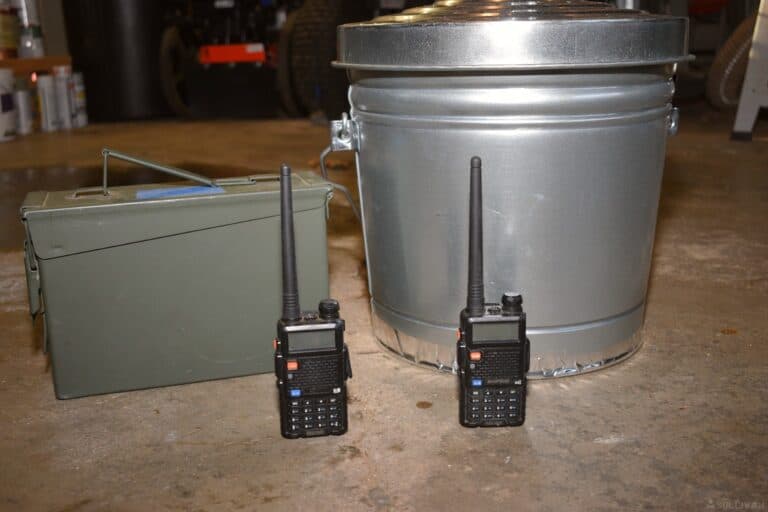
Baofeng radios are inexpensive, small, and capable of communicating over miles.
23. HAM Radio
Nothing reaches around the world like a good multi-band HAM radio and the knowledge to use it properly. HAM base stations can also be incredibly delicate.
A well-constructed faraday cage is the most effective storage location for your expensive communication gear.
24. Scanner
A scanner can tell you all about the radio activity in your immediate area. As with most other communications gear, either keep it in a faraday cage, or if you have kept the original packaging, wrap it in several layers of aluminum foil.
25. SDR
Software Defined Radio is a great tool for turning your laptop into a versatile and wide-band HAM receiver. As they are small, just package them up with your EMP-secured laptop.
26. Cell Phone and Cell Batteries
While there is a good chance that cell phones and the supporting networks will be down after an EMP, there is no arguing their utility.
Load your phone with apps and prep books and texts. Pack a spare loaded cell phone and enough batteries to run it for a week in a Faraday cage.
27. Headphones
Most headphones (the non-noise reduction ones) are simple and should be relatively EMP-proof.
In a survival situation, use headphones to save power and to reduce your sound footprint. Keep a pair or two in a Mylar bag for protection.
28. Field Telephone
A field telephone supports short-range communications that are extremely secure. As they can use several hundred yards of communication wire, they are susceptible to an EMP when fielded.
Keep the phones disconnected and in a Faraday cage with the wire stored separately.
Security
You can go old-school with security, but some things are just better done with electronics.
29. Optics
Scopes will have absolutely no issues with an EMP. More modern holographic and red-dot sights not so much. Luckily, they are small and you can fit several spares in an ammo can faraday cage.
30. Alarms
A system such as Dakota Alerts can provide motion, vehicle, and beam-breaking sensors up to a mile away.
Other similar alarm systems also give you the freedom to put a security perimeter in a place where you want it, not where you’re limited to placing it.
As with the other sensitive electronics on this list, keep them in a faraday cage until needed.
31. Security Cameras and Monitors
It’s never been easier to get eyes all over your property. With a private wireless router and a few cameras, you can get coverage 24/7.
You’ll need monitors and potentially a laptop or cell phone to review the footage. Keep your entire security kit in a Faraday cage.
32. Safe with Electronic Lock
I have resisted safes with electronic locks for two reasons:
- modern batteries corrode at a moment’s notice
- they are hard to protect.
Your best bet is to drape the entire safe with a protective cloth. Alternatively, a safe with a mechanical lock is your best protection.
Health
Modern technology hasn’t stopped at the doctor’s office. A few protected items in your preps may help extend or save a life
33. Thermometer
Yup, I know the good old fashion mercury and alcohol thermometers work just fine, however for a quick and accurate temperature digital is the way to go. Set up a separate Faraday cage for medical gear and store one or two thermometers.
34. Glucometer and Other Diagnostic Equipment
Diagnostic medical equipment is hard to replicate without electricity. Glucose test strips and a meter are the go-to standard for checking your sugar.
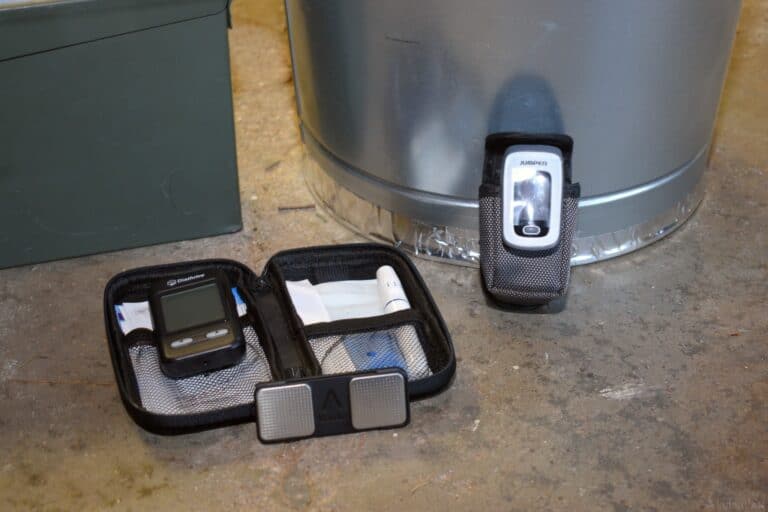
A glucometer, PulseOximeter, and mobile EKG are critical components to your medical diagnostics kit
Other diagnostic equipment like a Mobile EKG, otoscope, pulse oximeter, or blood pressure cuff. As these contain sensitive and calibrated electronics, keep them in a well-sealed Faraday cage.
35. Refrigerator or Icemaker
A glass of ice water may seem an unnecessary luxury after a grid failure, however, for those who require climate-controlled medicine storage, it’s no luxury.
Keeping a drug at a proper temperature may mean the difference between a quick expiration and months of longevity.
If you are in this situation it may be worth it to wrap a small refrigerator (in original packaging) in foil. Alternatively, store an ice-maker and a quality cooler.
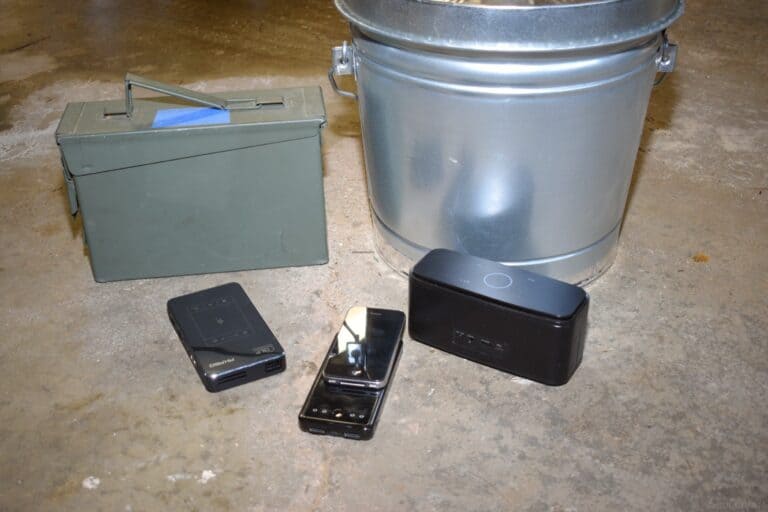
From left to right a pico projector, cell phone, spare battery, and a Bluetooth speaker are all critical to relaxing and filling the down hours.
Entertainment and Resources
Don’t forget the downtime. Boredom is as much of a demotivator as stress. A little time relaxing with a book or a movie can recharge you quickly.
36. Pico Projector
A little projector is a substitute for a monitor and a big screen. Plug it into a laptop, DVD/Blu-ray player, or laptop. Keep it in a well-sealed faraday cage.
37. EBook Reader
Nothing provides escape like a good book. A few hours in a fantasy land can reset your mind. Alternatively, you can load up an EBook with reference materials.
As these readers consist of sensitive electronics, they need a protective environment. Store a spare reader in a faraday cage.
38. MP3 Player
For some, myself included, music is a required distraction. From sleeping, cooking, and gardenwork, music is always in the background.
A small MP3 player, or alternatively, an old cellphone loaded with music is an easy way to fill space in any of your faraday cages.
39-40. Laptop/Tablet
A laptop or tablet loaded with videos, books, PDFs, and other reference materials can be a lifesaver. You can even download individual Wikipedia pages as PDFs.
Regardless of the data and applications you store, a fully loaded laptop (and associated hard drives) is valuable and potentially irreplaceable. Keep it sealed up in a faraday cage.
Wrapping up EMP Protection
We all lead an electronic lifestyle. It’s a part of modern society. Take a look around you and prioritize the electronic devices in your life. From absolute necessities to mere conveniences every device has a ranking.
Start with the most critical devices and protect them, then work your way down the list as money and space allows.
Most of the devices can be protected in an ammo can or garbage can Faraday cage. A few exceptions are better protected in place with faraday drapes or improvised cages.
Regardless, the cost of a spare device and a garbage can cage is cheap insurance against the biggest nightmare of total electronic loss.
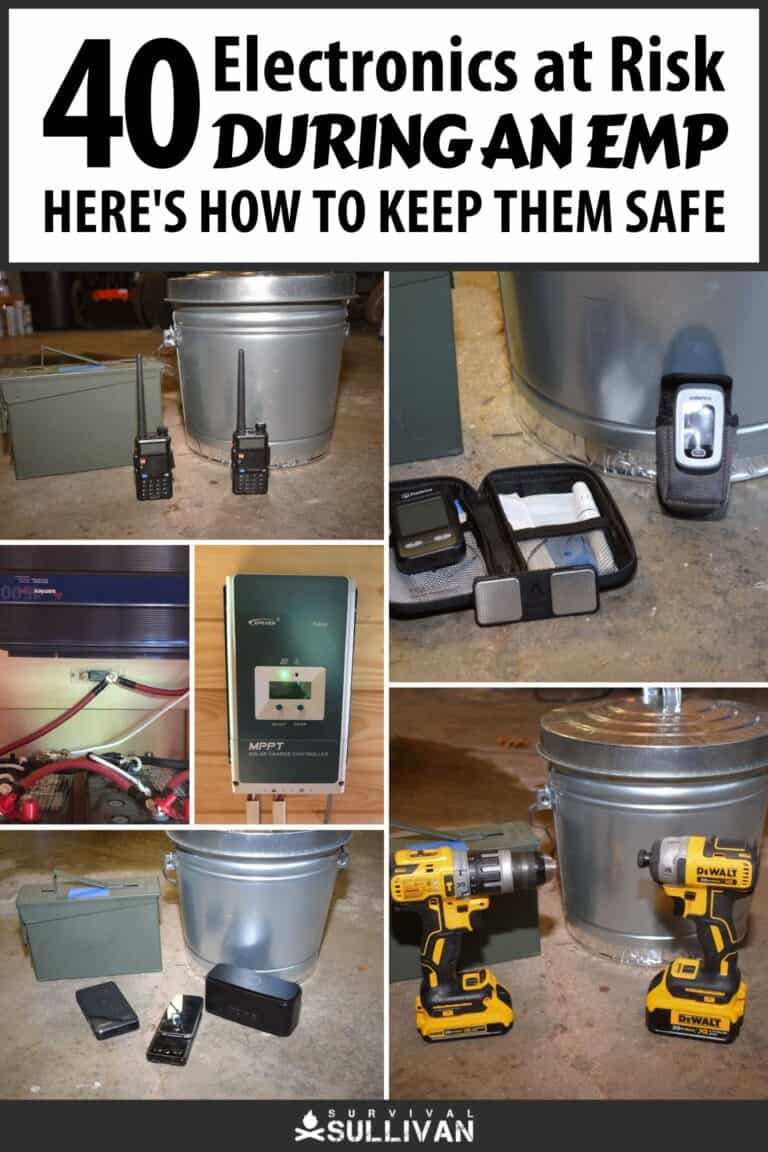
The post Here’s How To Protect These 40 Electronics From EMPs appeared first on Survival Sullivan.
By: M. I. Grey
Title: Here’s How To Protect These 40 Electronics From EMPs
Sourced From: www.survivalsullivan.com/electronics-emp-protection/
Published Date: Thu, 23 Feb 2023 00:00:00 +0000
-------------------------------------------------------------------------
Did you miss our previous article...
https://outdoorsnewswire.com/survivalist/best-place-for-preppers-to-live-in-north-carolina
 CampingSurvivalistHuntingFishingExploringHikingPrivacy PolicyTerms And Conditions
CampingSurvivalistHuntingFishingExploringHikingPrivacy PolicyTerms And Conditions
